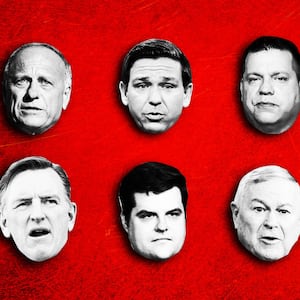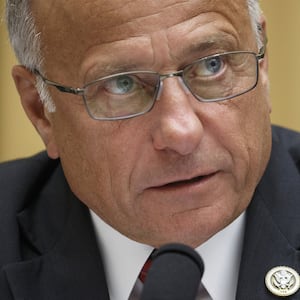As he gears up for a difficult re-election cycle, Rep. Steve King’s campaign is strapped for cash. Individual donations to the Iowa Republican have continued to flow but support from corporate donors and King’s own colleagues have vanished entirely.
King has not received a single contribution this year from a political action committee associated with a sitting member of Congress. Corporate PACs and interest groups have also completely shunned him. Through the first six months of the year, King received just two contributions from third party political entities: $2,000 donations from PACs associated with two former members of Congress, Lamar Smith (R-TX) and the infamous Todd Akin (R-MO).
It is a remarkable though not entirely unpredictable abandonment of a sitting member of Congress. Though he was always controversial and further to the right than most of his colleagues, King has burned virtually all his bridges in the party this year with outlandish comments about white supremacy and abortion.
But while those comments have made King a pariah in the party—with House Republican leaders stripping him of his committee assignments—King has refused to leave office. Now, as he faces the toughest campaign since he was first elected in 2002, he is doing so with a potentially catastrophic lack of resources. The $18,365 that King’s campaign had in the bank at the end of June was the least cash on hand he’s ever reported after the first six months of a cycle.
King is dealing with that lack of resources as he faces very immediate threats to his incumbency. His 2018 Democratic opponent, former professional baseball player J.D. Scholten, lost by fewer than three points last year, and is making another run for the seat. This time around King also has a formidable Republican primary opponent, state senator Randy Feenstra, who has already scored endorsements from influential Iowans such as evangelical leader Bob Vander Plaats. At the end of July, Feenstra’s campaign committee reported having $337,314.30 cash on hand, compared to King’s $18,000.
Things weren’t always so financially dire for King. Throughout his time in the House, he has received more than $3 million from political groups associated with private companies, trade associations, members of Congress, and ideological advocacy groups. That support peaked during the 2012 cycle, when such groups donated nearly $700,000 to his re-election campaign.
King’s top industry donors throughout his career, according to an analysis of Federal Election Commission records, were the American Bankers Association, the National Association of Homebuilders, AT&T, Crystal Sugars, and the Rain and Hail Insurance Society. All of them last donated to King during the 2018 election cycle but have so far declined to do so in this cycle.
In fact, some are even funding his primary challenger. At least six industry PACs that have donated to King in the past, including those affiliated with shipping giant UPS and trade associations representing construction and agricultural firms, have chipped in to Feenstra’s campaign this year instead.
Contributions from Republican Party organs have also evaporated completely. King never relied too heavily on such donations—he generally received about $5,000 per cycle from GOP committees, with the most, about $32,000, coming during the 2010 cycle. But it appears he’ll be fighting for re-election next year without any financial assistance from his party, which is raising record sums this year.
Far from supporting King’s re-election, top Republicans are pressuring him to resign. Rep. Liz Cheney, the fourth-ranking House Republican official, reiterated those calls last week after King made outlandish comments opposing abortion for rape victims.
One of King’s only two PAC contributors this year came from former Rep. Todd Akin, who lost his seat in Congress after making his own infamous remarks about abortion in such cases. His group, Takin Back America, donated to King’s campaign in February, just weeks after King denounced criticism of white supremacy.
“White nationalist, white supremacist, Western civilization,” King said in an interview with The New York Times. “How did that language become offensive?”
Correction: This piece originally stated that individual donations to King were down considerably. In fact, they are roughly on par with previous cycles. The congressman's financial troubles are due to a drop in corporate and political donations.







